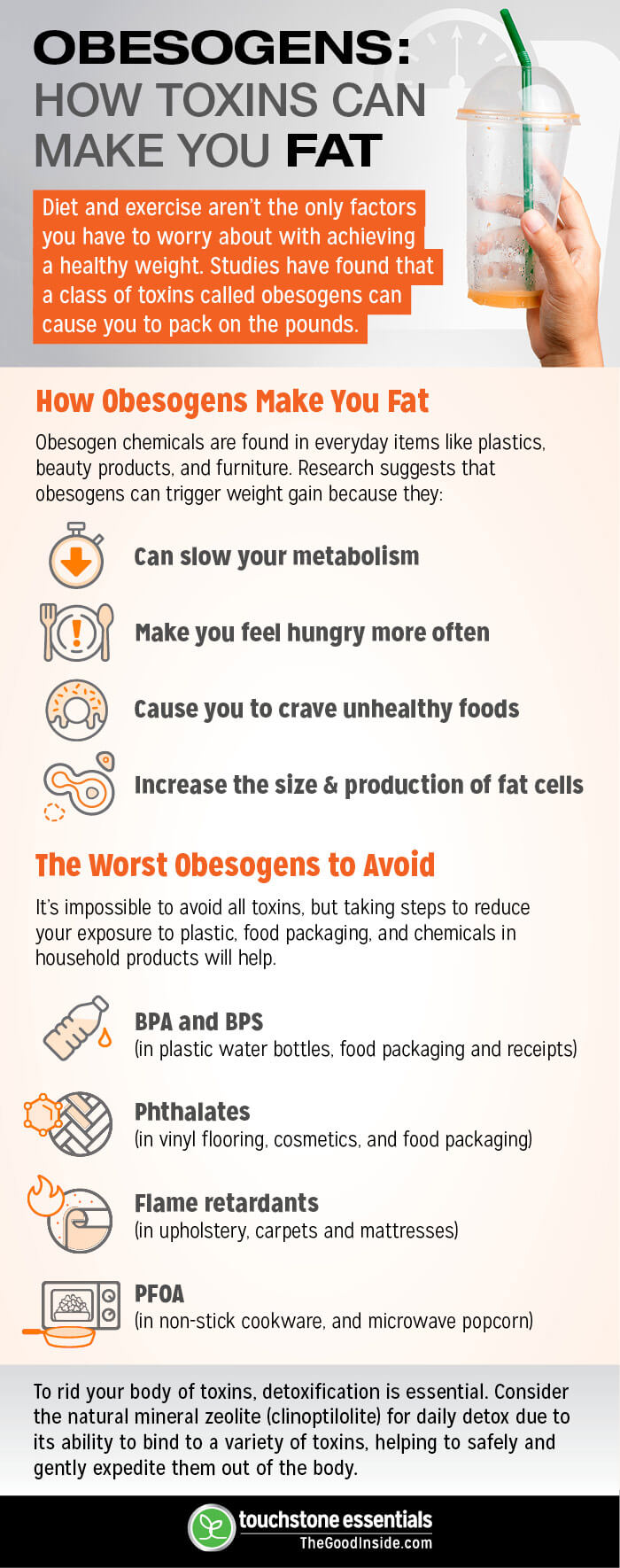Obesogens: How Toxins Can Make You Fat

Some people simply can’t reach a healthy weight with traditional weight loss tactics. No matter how many times they exercise or salads they eat, the scales don’t budge. If this is your struggle, don’t beat yourself up. There’s a whole lot more to weight loss than calories in and calories out.
While there can be many different causes of weight gain, evidence suggests that toxins in the environment called obesogens can have a surprising impact on your ability to lose weight (1).
What are Obesogens?
Obesogens are typically man-made chemicals that interfere with your hormones. As their name suggests, when these chemicals get into your body, they slow your metabolism and make you more likely to gain weight (2).
But a slower metabolism isn’t the only way obesogens can make you gain weight. These nasty chemicals can trigger several different physiological effects in the body that promote weight gain.
Scientists have discovered that obesogens can affect feelings of satiety. In other words, obesogens can make you feel hungry more often and increase your cravings for unhealthy comfort foods.
Obesogens can also tell your body to produce more fat cells and cause existing fat cells to grow larger. Since many obesogens cause oxidative damage and inflammation, it’s likely they promote weight gain in this way as well (3, 4).
Obesogens may not be the sole cause of weight gain, but they certainly can make losing weight much more difficult. So, if you want to lose weight, protecting yourself from the effects of obesogens could make a big difference.

BPA (Bisphenol A) is an Obesogen
BPA and its sister compound BPS are found in many food, beverage and consumer products. To avoid exposure, limit your use of plastic whenever possible by using glass storage containers or stainless-steel water bottles. BPA is commonly found in:
- Plastic water bottles
- Food packaging
- The lining in metal food cans
- Cash register receipts
- Food storage containers
Studies have found BPA exposure can promote substantial weight gain in both animals and humans (5). BPA is also linked to heart disease, diabetes, thyroid dysfunction, and cancer (6, 7). Its replacement, BPS, is also suspected of negative health effects (8).
Phthalates Are Obesogens
Phthalates are a class of chemicals that manufacturers use to increase the flexibility of plastics and vinyl. Phthalates are often found in:
- Cosmetics
- Personal care products
- Plastic toys
- Vinyl flooring
- Plastic pipes
- Detergents
- Food packaging
Phthalates should be avoided since they readily absorb into your body when you touch a phthalate-containing material. Phthalates can also contaminate food, your home’s air, and water. Evidence suggests phthalates can disrupt your hormones, slow down your metabolism, and cause weight gain through insulin resistance (9, 10, 11).
Flame Retardants Are Obesogens
Flame retardants are added to many household items. To avoid exposure, choose furniture labeled to be free of added flame retardants, and purchase a well-designed home air purifier capable of filtering out VOCs (volatile organic compounds). Flame retardants are commonly in:
- Upholstery
- Furniture
- Carpet
- Mattresses
As these items break down over time, microscopic particles containing the flame-retardant chemicals get into your home’s dust and air. Animal studies have found that flame retardants can lower the body’s capacity to break down fats, resulting in significant weight gain (12).
The National Institute of Environmental Health Sciences also notes that flame retardants are linked to hormone disruption, cancer, abnormal fetal development, and immune system damage (13).
Polyfluoroalkyl Chemicals (PFCs) Are Obesogens
PFCs of which PFOA (perfluorooctanoic acid) is most common, are a class of chemical that is so widespread they are found in the blood of more than 98% of Americans (14).
Studies indicate that exposure is linked to thyroid disorders which can lead to weight gain (15). Animal research also shows that PFOAs can lead to insulin resistance and increased weight gain later on in life (16).
To avoid exposure, ditch your non-stick cookware, avoid microwave popcorn, and install a high-quality water filter in your home to remove this toxin from drinking water.
Detoxing to Reduce Obesogens
It’s not possible to completely avoid all obesogens. That’s why it’s important to continuously detoxify your body. One of the best ways to do this is to take a zeolite supplement. When ingested, zeolite particles act like a magnet, attaching to toxins and shuttling them out of your body.
Detoxifying this way daily is critical because you’re constantly exposed to obesogens even if you reduce your exposure. Plus, many toxins tend to accumulate in your body’s tissues. This means you likely have decades worth of obesogens built up in your system that need to be removed.
When selecting a zeolite supplement, ensure that the product uses nano-sized particles. This allows the zeolite particles to freely travel throughout your body for a deep-tissue detoxification.
It’s also important to note that when detoxing, you should eat plenty of organic fruits and vegetables to give your body antioxidant support throughout the process.
The Bottom Line
The first step to protecting yourself from any toxin is to minimize exposure. Simply being aware of common obesogens and where they are found means you can take necessary steps to avoid some of these toxins.
However, there’s no way to avoid all toxins, and you may have years or decades worth of toxin build-up. That’s why detoxification is vital to rid yourself of obesogens and other damaging toxins.
While healthy eating and exercise are two important aspects for a healthy weight, they are far from the only factors involved. Being lean also comes from maintaining a healthy gut microbiome, managing inflammation, and protecting your body from toxins such as obesogens. Together, these factors can help ensure a healthy weight.